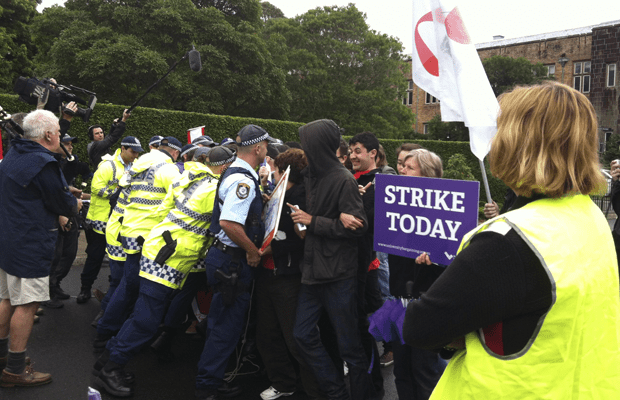A ballot conducted by the National Tertiary Education Union (NTEU) has revealed that 98 per cent of USyd union members support taking industrial action, as Enterprise Bargaining Agreement (EBA) negotiations reach a critical phase.
USyd’s EBA with staff is renegotiated every four years and determines working conditions and wages. Whilst the NTEU’s vote does not guarantee strikes, it does communicate a distinct possibility of industrial action in the event that the union’s demands in relation to greater employment security, working conditions for casual staff, and opportunities for career progression are not met.
Striking and industrial action is nothing new at USyd. During the last EBA negotiations in 2013, the hostility of University management toward staff demands resulted in a tumultuous atmosphere on campus. While there were interruptions to academic life, including cancelled lectures and tutorials, arguably the more profound impact occurred beyond the classroom walls.
Fifth year Media and Communications student Liam Carrigan says the picketing and strikes that ensued provoked some of the “most horrific police violence ever seen on campus”. While for the vast majority of students, industrial action resulted in a slightly disrupted teaching schedule, Liam argues that the students most affected by the strikes were those who supported staff on the picket line. With University management colluding with police to ensure a near constant presence on campus, brawls and physical altercations between staff and police were not uncommon.
However, given the more amicable relations between management and staff throughout the EBA negotiations this year, the violence and intensity of the strikes seems unlikely to repeat itself. USyd Community and Public Sector Union (CPSU) Branch President Grant Wheeler told Honi, “In the last round of bargaining over 2012–2013, the University treated the negotiation process as an opportunity to launch a broad-ranging assault on staff conditions,” which led to seven days of strike action.
In contrast, Wheeler believes the University has been “more respectful this time, and they have been more willing to genuinely negotiate in some significant areas. We’ve been reluctant to consider industrial action to this point as we want to ensure the University feels that its more reasonable approach to bargaining in this round of negotiations generates an equally considered response from the unions.” Given the CPSU stands to represent all non-academic employees — such as administrative, technical, and library staff — any action on their behalf is likely to impact the more bureaucratic elements of student experience, without many direct academic consequences.
There is also a strong movement amongst USyd students to support any action staff might take. In light of this, the Students’ Representative Council (SRC) has passed a motion to close office during any strike actions as a show of solidarity with the NTEU. SRC President, Isabella Brook, affirms that “The SRC will always stand for worker’s rights and values the contributions of university staff to the USyd community … and believe that the only form of power they have is withholding their labour.” Yet Brook is quick to point out that a closed office will not have a considerable impact upon students who access the critical services that the SRC provides. Students will continue to have access to casework and legal services despite the principled stance that the SRC takes in support of industrial action.
Honi contacted the University of Sydney Union (USU) to ask if they will be striking in solidarity as well, but had received no reply at the time of publication.
Ultimately, the impact of industrial action upon students depends on their willingness or desire to engage with staff struggle outside of the classroom. Whilst there may be some academic implications for a period of time, the hardest fight appears to be “on the picket lines”.





